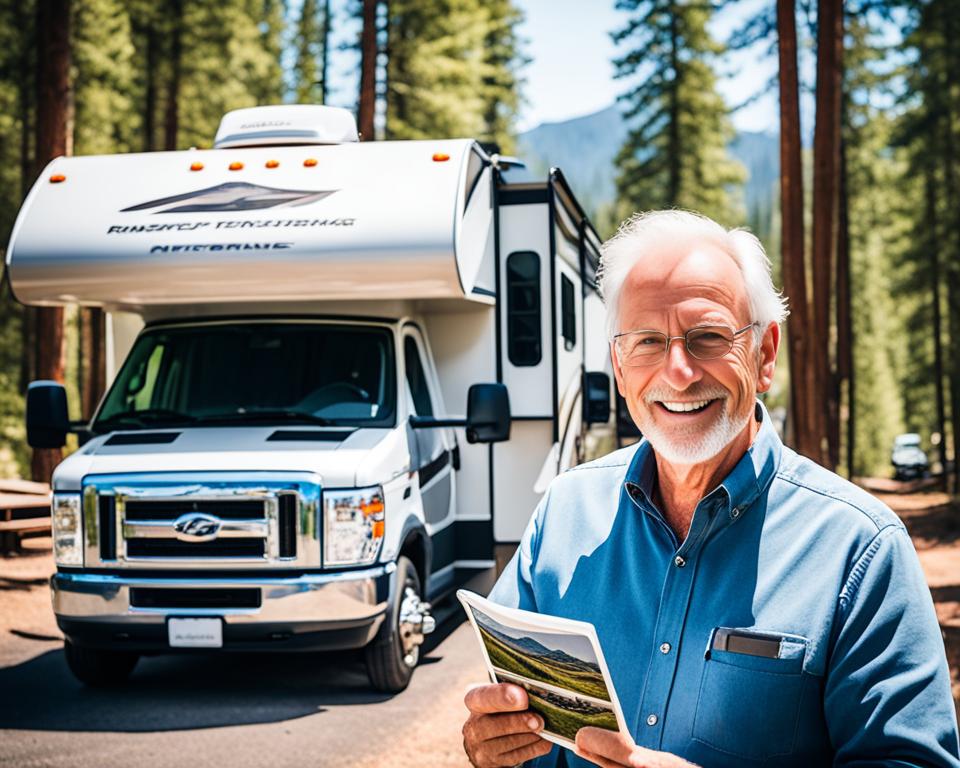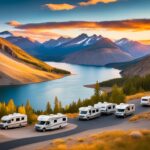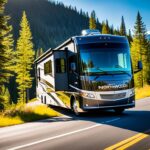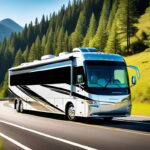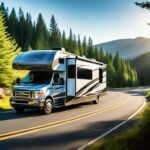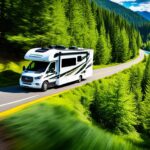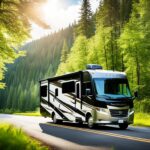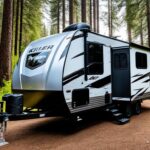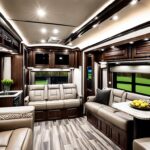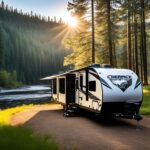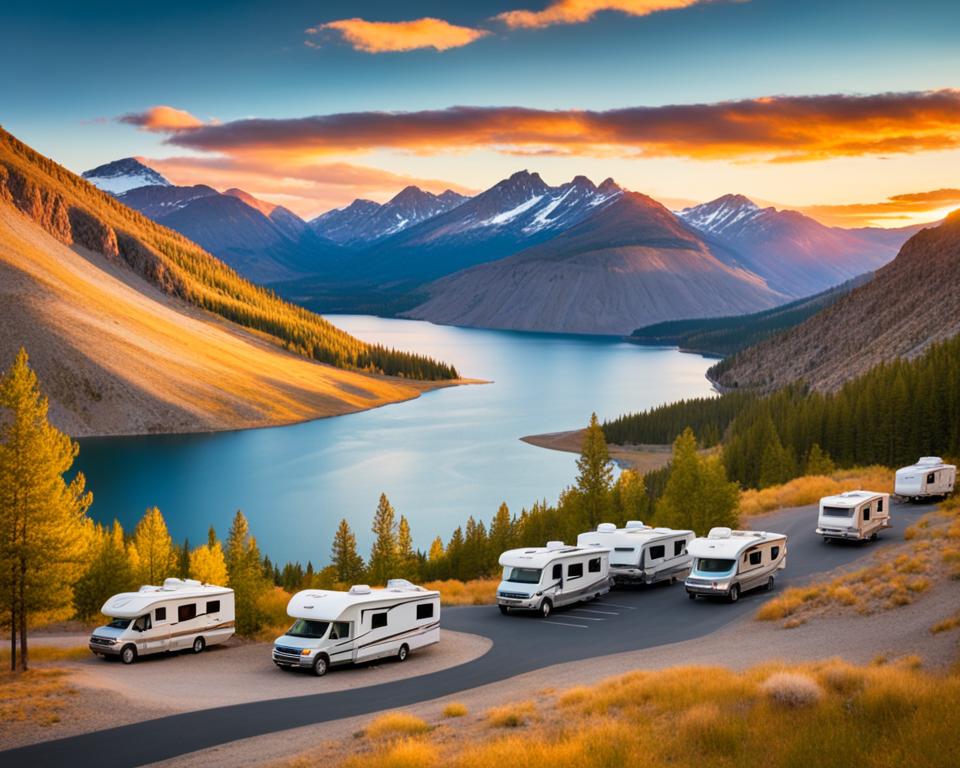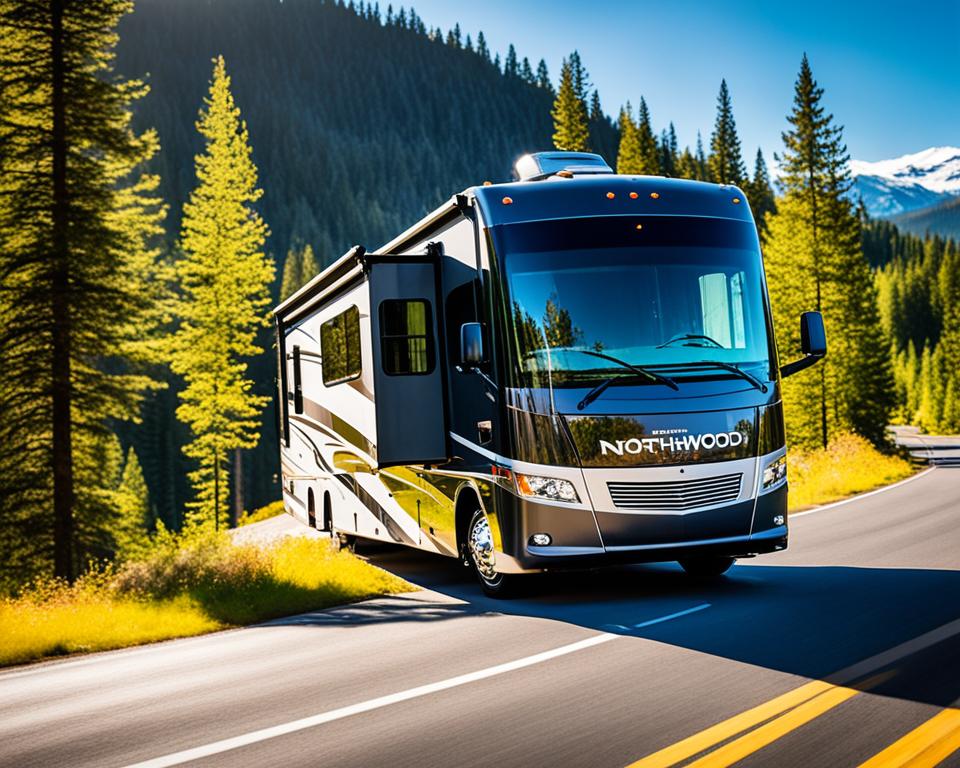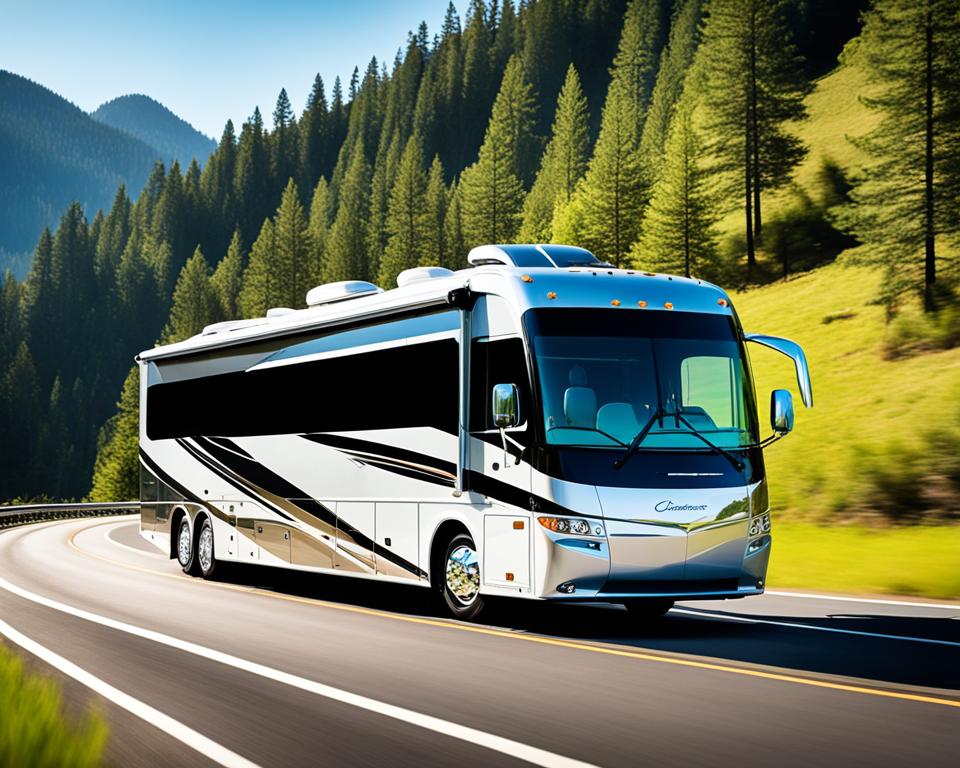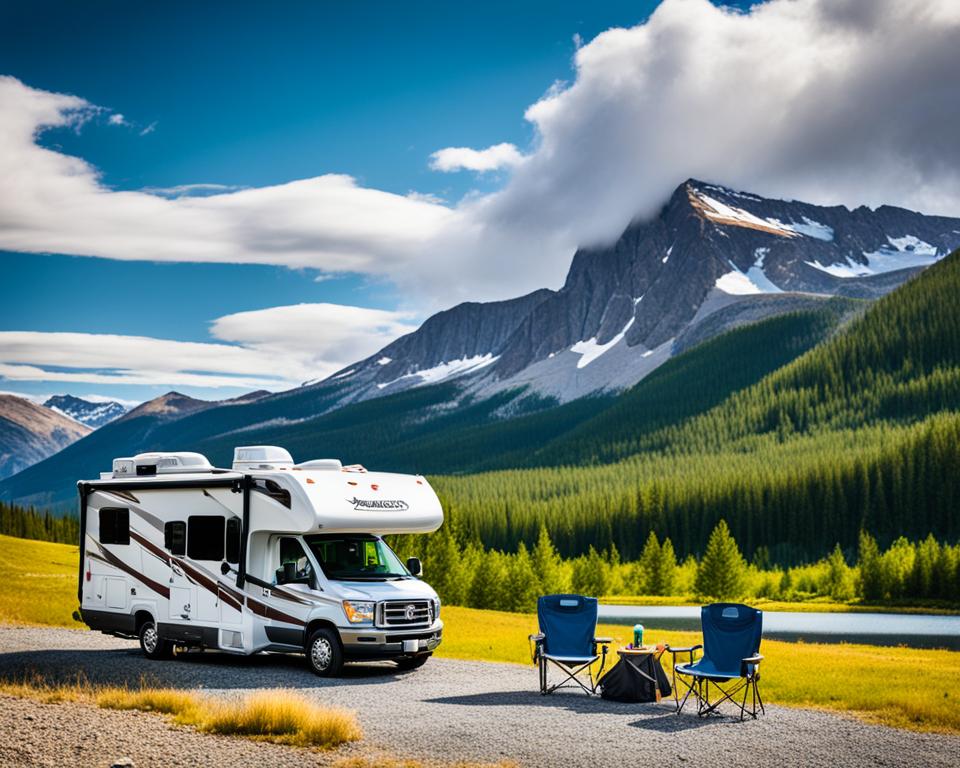Before diving into the world of RVing, it’s important to understand the key tips for buying your first RV. With more than 72 million Americans planning on taking an RV trip in the next year, there’s no better time to explore the world of RV ownership. This guide will provide you with essential tips and considerations to make a successful purchase.
Key Takeaways:
- Do thorough research before buying an RV to ensure it fits your needs.
- Create a checklist of features and amenities you want in an RV.
- Determine your budget and explore financing options.
- Consider your travel plans, camping style, and activities you plan to do while RVing.
- Look for reputable RV brands and read reviews.
How Will You Use Your RV?
When purchasing an RV, it is essential to consider how you plan to use it. Understanding your RV usage and travel frequency will help you choose the right type and size of RV that best suits your needs.
Ask yourself questions like:
- Will you use your RV for summer vacations with family?
- Are you planning weekend getaways?
- Do you have ambitions of full-time living on the road?
Your answers to these questions will provide valuable insight into your RV usage and travel frequency. If you plan to go RVing frequently or full-time, you may need a larger and more versatile RV that can accommodate long-term living. On the other hand, if you plan to use your RV for occasional vacations and short trips, a smaller and more compact RV may be suitable.
Understanding your RV usage will also help you determine other factors such as the number of sleeping areas needed, storage requirements, and amenities necessary for comfortable living while on the road.
Keep in mind that full-time RV living requires careful consideration and planning. It involves a lifestyle change and adapting to a smaller living space. Part-time RVing, on the other hand, offers flexibility and freedom to explore different locations while still having a home base.
Buying an RV without considering how you will use it is like buying a house without knowing how many rooms you need. Take the time to evaluate your RV usage and travel frequency to choose an RV that perfectly fits your lifestyle.
Who Will You Go RVing With?
Another important consideration when buying an RV is the company you’ll be traveling with. Are you planning to go RVing with your family, or will you be embarking on solo adventures? And don’t forget about your furry friends! If you have pets, you’ll need to take their needs and comfort into account when choosing an RV.
Traveling with family can create unforgettable memories and bonding experiences. Whether it’s setting up camp together, roasting marshmallows by the campfire, or exploring the great outdoors as a unit, RVing with your loved ones offers a unique opportunity to strengthen connections and create lasting traditions.
On the other hand, RVing solo can provide a sense of freedom and self-discovery. You have the flexibility to follow your own schedule, explore new destinations, and indulge in some well-deserved alone time. It can be a chance to reconnect with yourself and nature, allowing for personal growth and reflection along the way.
And let’s not forget our beloved pets! RVing with pets can be a joyous experience, but it requires some extra planning and accommodations. Whether you have a dog, a cat, or even some feathered or scaled friends, their well-being and comfort are important considerations. Make sure your chosen RV has the necessary space and amenities to cater to your pets’ needs, such as dedicated sleeping areas, secure travel arrangements, and adequate ventilation.
Choosing the Right RV
The number of people and pets you’ll be RVing with will impact the size and layout of the RV that best suits your needs. Consider the number of beds, the size of the dinette or living area, and the availability of storage space for all your travel essentials. Some RVs even offer specific features like pet-friendly flooring or outdoor pet wash stations to make RVing with pets a breeze.
Here is a comparison table of RV sizes and their suitability for different travel companions:
| RV Size | Suitable for |
|---|---|
| Class A Motorhome | Large families or groups with pets |
| Class C Motorhome | Families or small groups with pets |
| Travel Trailer | Families or couples with pets |
| Fifth Wheel | Couples or small families with pets |
| Camper Van | Solo travelers or couples with a small pet |
Remember, traveling companions bring joy and shared experiences to your RV adventures. Consider their needs and make sure your chosen RV can accommodate everyone comfortably. The road awaits, so start planning your epic RV journey!
What’s Your Camping Style?
Your camping style plays a significant role in determining the type of RV that suits your needs. Whether you enjoy boondocking in remote locations or prefer the luxuries of RV resorts, understanding your preferences will help you find the perfect recreational vehicle. Consider the following camping styles to determine which features and amenities are essential for your RV:
Boondocking
For those seeking an off-grid adventure, boondocking offers an opportunity to reconnect with nature in remote locations. Boondocking involves camping in undeveloped areas without access to amenities such as water, electricity, or sewer hookups. It’s an excellent choice for those who enjoy solitude and self-sufficiency. To fully embrace boondocking, you’ll need an RV equipped with features like solar panels, large water holding tanks, and a robust battery system to support extended stays without external hookups.
RV Resorts
If you prefer a more luxurious camping experience with resort-like amenities, RV resorts are the way to go. From swimming pools, fitness centers, and entertainment facilities to organized activities and events, RV resorts provide a wealth of conveniences and social opportunities for a truly enjoyable stay. Choosing an RV with spacious living areas, high-end appliances, and generous storage will enhance your resort-style camping experience.
Public Campgrounds
Public campgrounds offer a balance between adventure and basic amenities. These campgrounds are typically managed by government agencies and provide facilities such as restrooms, picnic areas, and sometimes even electrical hookups. Public campgrounds are ideal for those who want to experience the great outdoors while still having access to essential conveniences. When selecting an RV for public campgrounds, prioritize features like efficient space utilization, comfortable sleeping arrangements, and practical kitchen and bathroom facilities.
Luxury RVing
If you desire the ultimate in comfort and indulgence during your RV adventures, luxury RVing is the way to go. Luxury RVs feature upscale furnishings, state-of-the-art technology, and top-of-the-line amenities. These high-end motorhomes often include features like full-size kitchens, luxurious bathrooms, extravagant entertainment systems, and premium materials throughout. Investing in a luxury RV allows you to experience the pinnacle of comfort and style while exploring the open road.
Remember, there is no right or wrong camping style. It’s all about personal preference and what brings you the most joy and satisfaction during your RV travels.
Understanding your camping style is crucial when purchasing an RV. It ensures that your chosen recreational vehicle aligns with your preferences and enhances your overall camping experience.
What Activities Will You Do While RVing?
When planning your RV adventures, it’s important to consider the activities you’ll be doing along the way. Whether you enjoy kayaking, fishing, or engaging in other outdoor activities, your RV should be equipped to support your favorite pastimes. Additionally, if you plan on working from your RV, having a dedicated office space is essential. Understanding your planned activities will help you determine the storage and amenities you need in your RV.
Outdoor Adventures
If you’re an outdoor enthusiast, RVing opens up a world of opportunities. Whether you prefer kayaking along serene lakes, fishing in picturesque rivers, or hitting the trails with your 4x4s or dirt bikes, there’s an activity for everyone. Make sure your RV offers ample storage space for your gear, such as kayak racks, fishing rod holders, or a toy hauler for your off-road vehicles.
Working on the Go
Working from your RV provides the freedom to enjoy the outdoors while pursuing a career. To create a productive workspace, look for an RV that offers a dedicated office area. This could be a separate room, a convertible desk, or a comfortable seating area with a table. Having reliable internet connection options, such as built-in Wi-Fi or the ability to set up hotspot devices, is also crucial for staying connected while working remotely.
RV Activities Checklist
| Activities | RV Amenities and Storage Needs |
|---|---|
| Kayaking | Ample storage for kayaks, kayak racks |
| Fishing | Space for fishing gear, fishing rod holders |
| Off-Roading | Toy hauler for 4x4s or dirt bikes |
| Working from RV | Dedicated office space, reliable internet connection |
Being prepared with the right RV amenities and storage solutions for your chosen activities will enhance your overall RVing experience. Whether you’re embarking on thrilling outdoor adventures or balancing work and leisure on the road, your RV should cater to your unique needs.
Which RV Is Best for You?
When it comes to choosing the perfect RV, there are various types and options to consider. Whether you prefer the convenience of a motorhome or the flexibility of a towable RV, understanding the different RV types and brands is key to finding the best fit for your needs and preferences.
Towable RVs
One popular option is a towable RV, which can be hitched to a vehicle for easy transportation. Towable RVs come in a variety of types, each offering unique features and benefits. Some common towable RV options include:
- Pop-up campers: Lightweight and affordable, pop-up campers are great for first-time RV owners looking for a simple camping experience.
- Travel trailers: Travel trailers are versatile and come in various sizes, making them suitable for different travel preferences and group sizes.
- Fifth wheels: Fifth wheels provide ample living space and often feature high-end amenities, making them a popular choice for long-term travelers.
- Toy haulers: Toy haulers are perfect for outdoor enthusiasts who want to bring along their toys, such as motorcycles or ATVs. These RVs have a designated space at the back for safe storage and easy access.
Motorhomes
If you prefer a self-contained RV experience, a motorhome is worth considering. Motorhomes are motorized vehicles that combine both living and driving spaces. They come in three main classes:
- Class A motorhomes: Class A motorhomes are the largest and most luxurious option, providing spacious interiors and top-of-the-line amenities. They are often equipped with full kitchens, multiple bedrooms, and ample storage space.
- Class B motorhomes: Class B motorhomes, also known as camper vans, are compact and easy to maneuver. They are a great choice for solo travelers or couples looking for a nimble and efficient RV.
- Class C motorhomes: Class C motorhomes offer a balance between size and amenities. They are built on a truck or van chassis and usually feature a sleeping area above the driver’s cab.
Researching different RV types and brands will help you determine which one best suits your needs and preferences. Consider factors such as your travel style, the size of your group, and the level of luxury you desire. Take the time to explore the various options and visit dealerships to get a firsthand look at different RV models.
Which RV Brand Is the Best?
Once you’ve narrowed down the type of RV you want, it’s important to conduct thorough research on different RV brands. Each brand has its unique specialties and features, and it’s crucial to assess their reputation and quality. To make an informed decision, consider reading RV brand reviews and comparing different brands.
“Comparing RV brands allows you to understand the strengths and weaknesses of each manufacturer. It’s important to focus on factors such as build quality, customer satisfaction, warranty coverage, and overall brand reputation. This will help you find the best RV brand that suits your needs and preferences.”
By researching RV brands, you gain valuable insights into their reliability, durability, and customer satisfaction. Reviews from other RV owners can provide firsthand experiences and reveal any potential issues or advantages of owning a specific brand.
RV Brand Research: What to Consider
When conducting RV brand research, keep the following factors in mind:
- Build Quality: Assess the overall construction and craftsmanship of the RV brand. Look for durable materials and attention to detail in the manufacturing process.
- Customer Satisfaction: Check customer reviews to gauge overall satisfaction with the brand’s products and customer service.
- Warranty Coverage: Look into the warranty coverage offered by different RV brands. A good warranty can provide peace of mind and protect you from unexpected repair costs.
- Reliability: Consider the overall reliability of the RV brand. This includes assessing how well the brand’s models perform over time and their resistance to common mechanical issues.
- Innovation: Explore if the brand offers innovative features or unique designs that align with your preferences and needs.
By examining these factors, you can narrow down your options and choose the best RV brand for your future adventures.
RV Brand Comparison Table:
| RV Brand | Build Quality | Customer Satisfaction | Warranty Coverage | Reliability | Innovation |
|---|---|---|---|---|---|
| Brand A | Excellent | High | Comprehensive | Very Reliable | Innovative Features |
| Brand B | Good | Moderate | Limited | Reliable | Standard Features |
| Brand C | Poor | Low | Minimal | Unreliable | Basic Features |
The RV brand comparison table provides a snapshot of how different brands fare in terms of build quality, customer satisfaction, warranty coverage, reliability, and innovation. Utilize this table as a starting point to assess and compare the different brands you are considering.
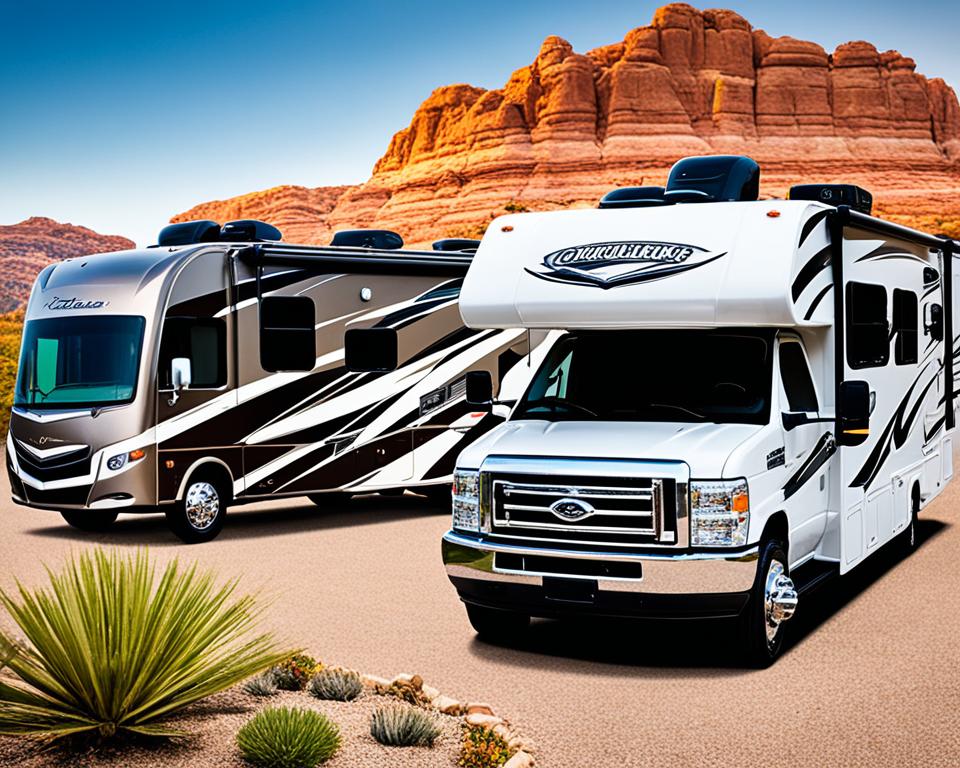
Remember, choosing the best RV brand involves considering various factors beyond the table’s data. It’s essential to take into account your personal preferences, budget, and specific needs when making a decision. Conducting thorough research and reading reliable RV brand reviews will help you find the perfect RV brand that aligns with your requirements and ensures an enjoyable and memorable RVing experience.
Budgeting for Buying an RV
Budgeting plays a crucial role when it comes to buying an RV. Understanding the cost range of RVs, exploring financing options, and determining your spending limit are essential steps in narrowing down your choices. While dreaming about your future adventures, it’s important to consider various factors such as new vs. used RVs, loan terms, and down payment requirements to effectively plan your RV budget.
When it comes to RV cost, the price range can vary significantly depending on the type, size, age, and condition of the RV. New RVs generally have a higher price tag compared to used ones, but they often come with warranty coverage and the latest features. On the other hand, used RVs can offer a more budget-friendly option, especially if you find one that has been well-maintained and meets your requirements.
Consider Financing Options
RV financing is a common option for buyers who prefer spreading out the cost over time. Banks, credit unions, and RV dealerships often offer financing programs specifically tailored for RV purchases. Understanding the different loan terms, interest rates, and monthly payment options will help you determine a comfortable and affordable financing plan. Remember to factor in the interest costs when comparing different financing options to make an informed decision.
Aside from financing, you may also need to save for a down payment. The down payment requirement can depend on the lender and the type of RV you are buying. Saving up for a down payment is an effective way to reduce the loan amount and potentially qualify for better interest rates.
Ultimately, the key is finding a balance between your desired RV and your financial capabilities. By setting a realistic budget, considering financing options, and aiming for a feasible down payment, you can confidently step into the RV buying journey with a solid financial foundation.
Whether you’re a budget-savvy buyer looking for a great deal or someone willing to invest in a top-of-the-line RV, determining your RV budget is a crucial step in making the right purchase. Take the time to research, compare prices, and crunch the numbers to ensure that your RV buying experience aligns with your financial goals and expectations.
Safety Considerations
Safety is of utmost importance when towing an RV. To ensure a secure and comfortable towing experience, it is crucial to consider the following factors:
Towing Capacity
Begin by understanding your vehicle’s towing capacity. This refers to the maximum weight your vehicle can safely tow. Exceeding the towing capacity can put strain on your vehicle’s engine, transmission, and brakes, compromising safety. Refer to your vehicle’s owner’s manual or consult with a professional to determine its towing capacity.
RV Weight Requirements
Next, consider the weight requirements of the RV you plan to tow. Each RV has a specified Gross Vehicle Weight Rating (GVWR), which indicates the maximum weight the RV can safely carry. Ensure that the combined weight of the RV and your cargo does not exceed the GVWR. Exceeding weight limits can negatively impact your vehicle’s stability, braking efficiency, and overall safety.
Braking Capacity
Proper braking capacity is essential for safe towing. Your vehicle’s brakes should have sufficient power to slow down and stop the combined weight of the vehicle and the RV. Consider investing in supplemental braking systems, such as electric trailer brakes or surge brakes, to enhance the braking efficiency and control while towing.
By carefully considering and understanding these safety factors, you can make an informed decision and select an RV that can be safely towed by your vehicle.
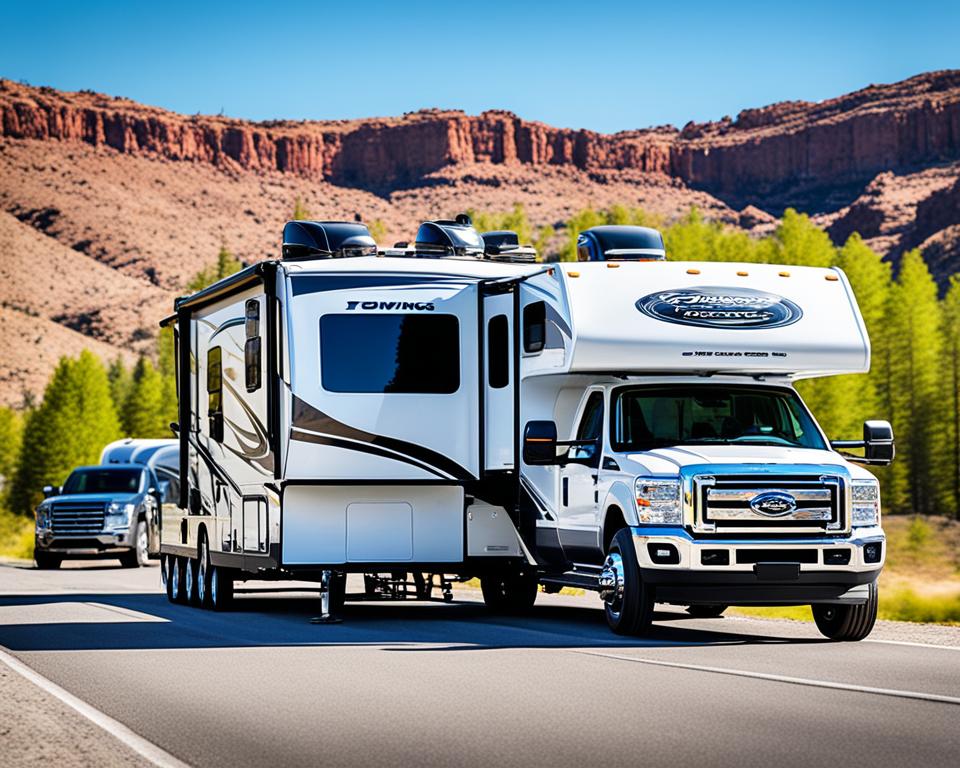
Long-Term Needs and Future Plans
When buying an RV, it’s crucial to consider your long-term needs and future plans. It’s not just about the present, but also about ensuring that your RV can adapt to your changing lifestyle in the years to come. Think ahead and envision how your family may grow or change and whether you’ll need additional storage or sleeping space.
As your RV lifestyle evolves, you may find yourself wanting to upgrade certain features or amenities. Whether it’s adding solar panels for sustainable power, installing a satellite dish for entertainment, or upgrading your kitchen appliances, having an RV that can accommodate these changes is essential.
Planning for the Future
Future RV plans may include longer trips, extended road journeys, or even eventually transitioning to full-time RV living. Consider how your ideal RV can meet these aspirations and provide the necessary comfort and functionality.
Furthermore, as your interests and hobbies develop, your RV should be able to cater to them. If you anticipate taking up new outdoor activities like kayaking, fishing, or mountain biking, having sufficient storage space or the ability to tow additional equipment becomes even more important.
“Investing in an RV that can accommodate your long-term needs and future plans will save you from the hassle and expenses of constantly upgrading or switching RVs,” says Mark Thompson, a seasoned RV enthusiast.
Adapting to Lifestyle Changes
Life is full of surprises, and your RV should be adaptable to whatever changes come your way. If you decide to work remotely or start a business while on the road, having dedicated office space or work areas can greatly enhance your productivity and overall experience.
Moreover, if you plan on inviting friends or family to join you on your RV adventures, having extra sleeping arrangements, such as convertible sofas or bunk beds, can make a significant difference in accommodating them comfortably.
Consider how your RV lifestyle may change as well. Will you spend more time in RV parks, exploring national parks, or boondocking in remote locations? Your RV’s size, power systems, and amenities should align with your evolving preferences.
| Long-Term Needs | Future Plans | RV Upgrades | RV Lifestyle Changes |
|---|---|---|---|
| Grow or change in family | Extended road trips | Solar panels for sustainable power | Transition to full-time RV living |
| Additional storage or sleeping space | Transitioning to full-time RV living | Satellite dish for entertainment | Engaging in new outdoor activities |
| Exploring new destinations | Upgraded kitchen appliances | Working remotely or starting a business |
Thinking ahead and considering your long-term needs and future plans is essential when buying an RV. By selecting an RV that can adapt to changes in your lifestyle, you can ensure years of enjoyment and flexibility on the road.
Warranty and Repair Considerations
When it comes to the longevity and maintenance of your RV, understanding the warranty coverage and repair process is crucial. A comprehensive RV warranty provides peace of mind, but it’s important to be aware that repairs can sometimes be time-consuming and may require your RV to be off the road for extended periods.
To ensure a smooth warranty and repair experience, it’s essential to research reputable RV service centers and read reviews from other RV owners. Look for service centers that specialize in RV repairs and have a track record of providing reliable and efficient service.
If you encounter any issues with your RV that require repair, it’s important to check the terms and conditions of your warranty to determine what is covered. Some warranties may have specific limitations or exclusions, so understanding the extent of the warranty coverage can save you from unexpected repair costs.
RV Repair Timeline
It’s also important to have a realistic expectation of the RV repair timeline. While small repairs can often be completed quickly, more complex repairs may take longer. Some repairs may require special parts or the expertise of specialized technicians, which can add additional time to the repair process.
To minimize disruptions to your travel plans, it’s recommended to schedule maintenance and repairs during periods when you don’t have immediate travel commitments. Planning ahead and allowing sufficient time for repairs will help to ensure a more seamless experience.
Choosing the Right RV Service Center
When selecting an RV service center, consider factors such as their reputation, experience, and customer reviews. Look for service centers that have a knowledgeable and skilled staff who are familiar with the specific make and model of your RV.
Additionally, verify that the service center is licensed, insured, and certified by relevant industry organizations. This ensures that they meet industry standards and have the necessary qualifications to provide quality repairs.
By entrusting your RV to a reputable service center, you can have confidence that your warranty claims will be handled properly and repairs will be done correctly, giving you peace of mind to enjoy your RVing adventures.
Understanding the warranty coverage and repair process is crucial for a smooth RV ownership experience. By researching reputable RV service centers, being aware of the repair timeline, and choosing the right service center, you can ensure that your RV is well-maintained, and any issues are addressed promptly.
Conclusion:
Buying your first RV is an exciting journey, but it requires careful consideration and research. By following this first-time RV buyer’s guide, you’ll be equipped with the knowledge and tips to make a successful RV purchase.
Remember to consider your usage, camping style, budget, and future plans to find the perfect RV for your adventures. Whether you’re planning on taking summer vacations with your family, embarking on full-time RV living, or enjoying weekend getaways, there’s an RV out there that’s tailor-made for you.
Take your time to research different RV types and brands, read reviews, and compare options. Pay attention to safety considerations and warranty details. By making informed decisions and understanding your needs, you can ensure a smooth and enjoyable RV ownership experience.
So, get ready to hit the road and create unforgettable memories in your new RV. Happy RV shopping!
FAQ
What are some essential tips for buying your first RV?
Some essential tips for buying your first RV include considering how you plan to use it, who you will be traveling with, your camping style, planned activities, researching different RV types and brands, budgeting, and safety considerations.
How will I use my RV and how often will I go RVing?
Understanding how you plan to use your RV, whether it’s for summer vacations, weekend getaways, or full-time living, and determining how often you will go RVing will help you choose the right type and size of RV.
Who will I go RVing with?
If you plan to go RVing with your family or travel solo, you’ll need to consider the number of people and pets you’ll be traveling with. This will impact the size and layout of the RV you choose.
What’s my camping style?
Your camping style will determine the type of campgrounds you prefer, such as boondocking in remote locations or staying at RV resorts with full amenities. This will help you determine the features and amenities you need in an RV.
What activities will I do while RVing?
Consider the activities you plan to do while RVing, such as kayaking, fishing, or taking your 4x4s or dirt bikes on the trail. If you plan to work from your RV, you’ll also need to ensure it has a dedicated office space.
Which RV is best for me?
There are various types of RVs to choose from, including towable RVs like pop-up campers, travel trailers, fifth wheels, and toy haulers, as well as motorhomes. Researching different RV types and brands will help you determine which one is best suited to your needs and preferences.
Which RV brand is the best?
Each RV brand has its own specialties and features. It’s important to research different RV brands, read reviews, and compare them to gain a better understanding of their reputation and the quality of their RVs.
How should I budget for buying an RV?
Budgeting for buying an RV involves understanding the cost range of RVs, exploring financing options, and determining how much you’re willing to spend. Factors like new vs. used RVs, loan terms, and down payment requirements will also impact your budget.
What safety considerations should I keep in mind when towing an RV?
Safety should be a top priority when towing an RV. Consider your vehicle’s towing capacity, the RV’s weight requirements, and your vehicle’s braking capacity to ensure a safe and comfortable towing experience.
What are some long-term needs and future considerations when buying an RV?
When buying an RV, think about your long-term needs and future plans. Consider if your family may grow or change in the coming years and if you’ll need additional storage or sleeping space. It’s important to choose an RV that can adapt to your changing lifestyle.
What should I know about RV warranties and repairs?
It’s important to understand the warranty coverage and repair process for your RV. While a warranty provides peace of mind, it’s essential to be aware that repairs can take time and may require your RV to be off the road for extended periods. Researching reputable RV service centers and reading reviews will help ensure a smooth warranty and repair experience.

